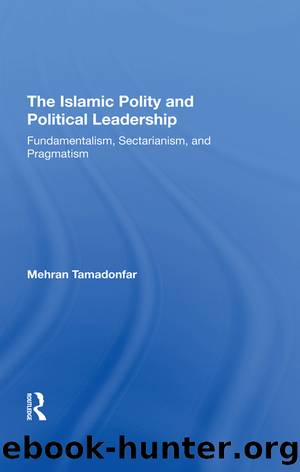The Islamic Polity and Political Leadership: Fundamentalism, Sectarianism, and Pragmatism by Mehran Tamadonfar

Author:Mehran Tamadonfar [Tamadonfar, Mehran]
Language: eng
Format: epub
ISBN: 9780367293260
Google: ErLByQEACAAJ
Goodreads: 52056590
Publisher: Routledge
Published: 1989-01-01T00:00:00+00:00
4
Islamic Political Leadership: Fundamentalism, Sectarianism and Pragmatism
In the first chapter I proposed that the study of Islamic political leadership should be carried out by a contextual approach which facilitates the study of this leadership as an integral component of the Islamic polity. Very few disputes exist over the ideological foundations, functional features and policy positions of the Islamic state. Major disputes have existed, however, over the question of leadership. Historically speaking, these disputes led to disintegrating sectarian trends, making the issue of political authority the core of sectarian and factional schisms in Islam.
In this chapter, the Islamic theories and practices of political leadership are studied. Despite the general acceptance of the indispensability of leadership, Islamic theories of leadership differ in terms of leadersâ qualifications, functions, sources of legitimacy and modes of succession to power. To a large degree, disagreements over these issues reflect the sectarian divisions in the ummah. The practice of leadership, however, has not been congruent with leadership theories. As charismatic patriarchal leaders in Islam were replaced by patrimonial ones who increasingly relied on weak bureaucratic apparatuses, the practice of leadership by the Sunnis increasingly reflected some Shiâi doctrinal positions. Bureaucratic patrimonialism superseded charismatic leadership through the overall bureaucratization of political authority. This development widened the gap between the theory and practice of Islamic political leadership. Therefore, as Manzooruddin Ahmed points out, to understand political authority in Islam, â⦠it would be necessary to sort out facts from fiction, theory from practice, and the ideal from the reality.â1
Download
This site does not store any files on its server. We only index and link to content provided by other sites. Please contact the content providers to delete copyright contents if any and email us, we'll remove relevant links or contents immediately.
The PFLP's Changing Role in the Middle East by Harold M. Cubert(155)
100 myths about the Middle East by Fred Halliday(139)
Revolution Without Revolutionaries by Bayat Asef(114)
US Nation-Building in Afghanistan by Conor Keane(112)
The Emergence of the Gulf States by J. E. Peterson(106)
Islam, Nationalism and Communism in a Traditional Society by Gabriel Warburg(94)
A Grammar of Ugaritic by John Screnock; Vladimir Olivero(86)
All the World Is Awry by R. Kevin Lacey(77)
The Islamic Polity and Political Leadership: Fundamentalism, Sectarianism, and Pragmatism by Mehran Tamadonfar(71)
Islamic Law in Circulation by Mahmood Kooria;(56)
Islam, Nationalism and Communism in a Traditional Society: The Case of Sudan by Gabriel Warburg(54)
Amazigh Politics in the Wake of the Arab Spring by Bruce Maddy-Weitzman(44)
